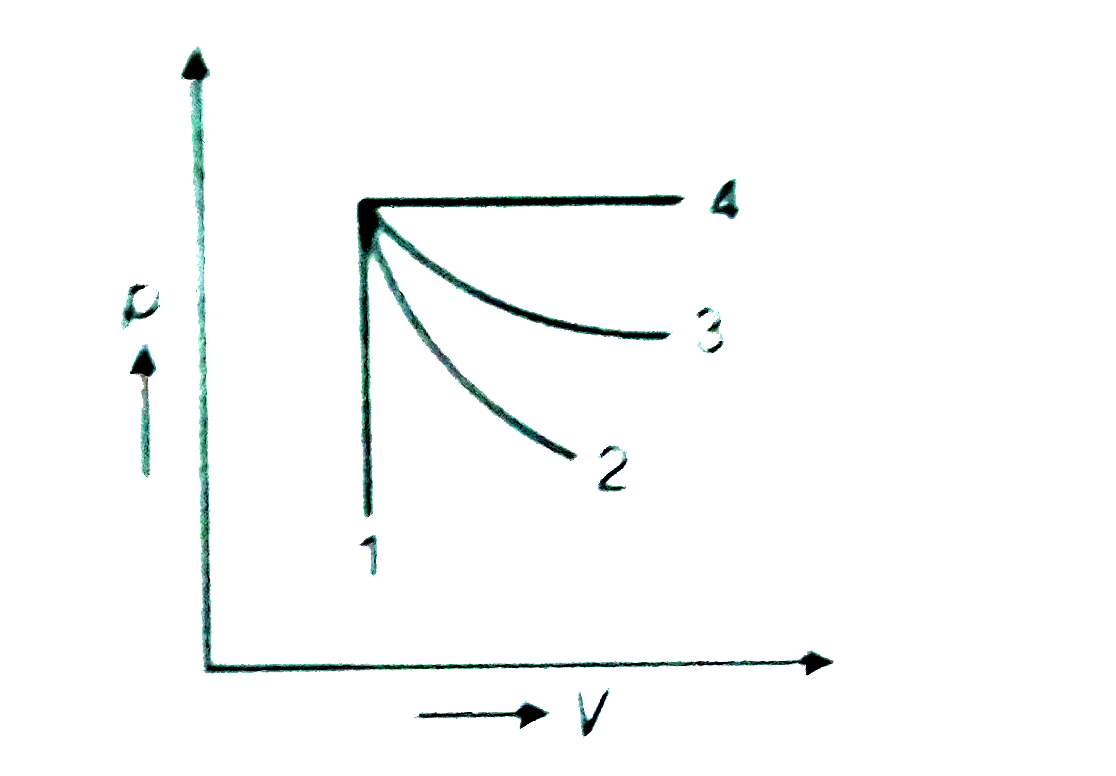An ideal gas undergoes four different processes from the same initial state as shown in figure of P-V diagram. Four processes are adiabatic, isothermal, isobaric and isochoric. Out of 1,2,3 and 4 which one is adiabatic ?
 Solution in Gujrati
Solution in Gujrati
4
3
2
1
The correct Answer is:C
For the curve 1 is parallel to pressure axis. So, volume is constant. So, this is isochoric process. Out of curves 2 and 3, curve 2 is sleeper so it is adiabatic and curve 3 is isothermal and curve 4 is parallel to volume axis. So, pressure is constant so this is an isobaric process.
Topper's Solved these Questions
- BOOK - KUMAR PRAKASHANCHAPTER - THERMODYANMICS EXERCISE - Section-D Ncert Exemplar Solution (MCQs More than one option )5videos
THERMODYANMICS
- BOOK - KUMAR PRAKASHANCHAPTER - THERMODYANMICS EXERCISE - Section-D Ncert Exemplar Solution (Very Short Answer )5videos
THERMODYANMICS
- BOOK - KUMAR PRAKASHANCHAPTER - THERMODYANMICS EXERCISE - Section-C (Objective Questions (Assertion & Reason )8videos
THERMODYANMICS
- BOOK - KUMAR PRAKASHANCHAPTER - THERMAL PROPERTIES OF MATTEREXERCISE - Question Paper (Section - D) (Answer following in brief :) Each carry 4 marks1videos
THERMAL PROPERTIES OF MATTER
- BOOK - KUMAR PRAKASHANCHAPTER - UNITS AND MEASUREMENTEXERCISE - Section -F (Questions from Module )20videos
UNITS AND MEASUREMENT
Similar Questions
Which of the processes described below are irreversible ?
02:28View SolutionCan a system be heated and its temperature remains constant ?
01:25View SolutionAssertion : Work and heat are two equivalent form of energy
Reason: Work is the transfer of mechanical energy irrespective of temperature difference, whereas heat is the transfer of thermal energy because of temperature difference only.02:00View SolutionIn an experiment on the specific heat of a metal, a 0.20 kg block of the metal at 150∘C is dropped in a copper calorimeter (of water equivalent 0.025 kg) containing 150 cm3 of water at 27∘C. The final temperature is 40∘C. Compute the specific heat of the metal. If heat losses to the surroundings are not negligible, is your answer greater or smaller than the actual value for specific heat of the metal ?
06:29View SolutionIf the error in measurement of radius of a shpere is 2% then the error in determination of volume of the sphere will be …………
01:25View SolutionAn ideal gas undergoes four different processes from the same initial state (figure). Four process are adiabatic, isothermal, isobaric and isochloric. Out of 1, 2, 3, and 4 which one is idabatic.
View SolutionAn ideal gas undergoes for different processes from the same initial state (figure). Four processes are adiabatic, isothermal, isobaric and isochoric. Out of 1, 2, 3 and 4 which one is adiabatic ?
04:22View SolutionOne mole of a monatomic ideal gas undergoes four thermodynamic processes as shown schematically in the -diagram below. Among these four processes, one is isobaric, one is isochoric, one is isothermal and one is adiabatic. Match the processes mentioned in List-1 with the corresponding statements in List-II.
03:06View SolutionThe given diagram shows four processes i.e., isochoric, isobaric, isothermal and adiabatic. The correct assignment of the processes, in the same order is given by:
03:15View SolutionAn ideal gas undergoes for different processes from the same initial state (figure). Four processes are adiabatic, isothermal, isobaric and isochoric. Out of 1, 2, 3 and 4 which one is adiabatic ?
 02:45View Solution
02:45View Solutionएक परमाण्विक आदर्श गैस (monatomic ideal gas) का एक मोल (one mole), चार ऊष्मागतीय प्रक्रमों (thermodynamic processes) से गुजरता है, जैसा कि नीचे PV व्यवस्था चित्र (schematic diagram) में दर्शाया गया है। यहाँ दिये गये प्रक्रमों में एक समदाबीय (isobaric), एक समआयतनिक (isochoric), एक समतापीय (Isothermal) और
02:30View SolutionWhat are isobaric, isochoric, isothermal and adiabatic processes?
02:54View SolutionAn ideal gas undergoes four processes: isochoric, isobaric, isothermal and adiabatic. In which process is (i) the change in internal energy zero?
03:37View SolutionAn ideal gas undergoes four processes: isochoric, isobaric, isothermal and adiabatic. In which process is (ii) the work done zero?
04:12View SolutionAn ideal gas undergoes four processes: isochoric, isobaric, isothermal and adiabatic. In which process is (iii) the heat exchange zero?
View Solution
